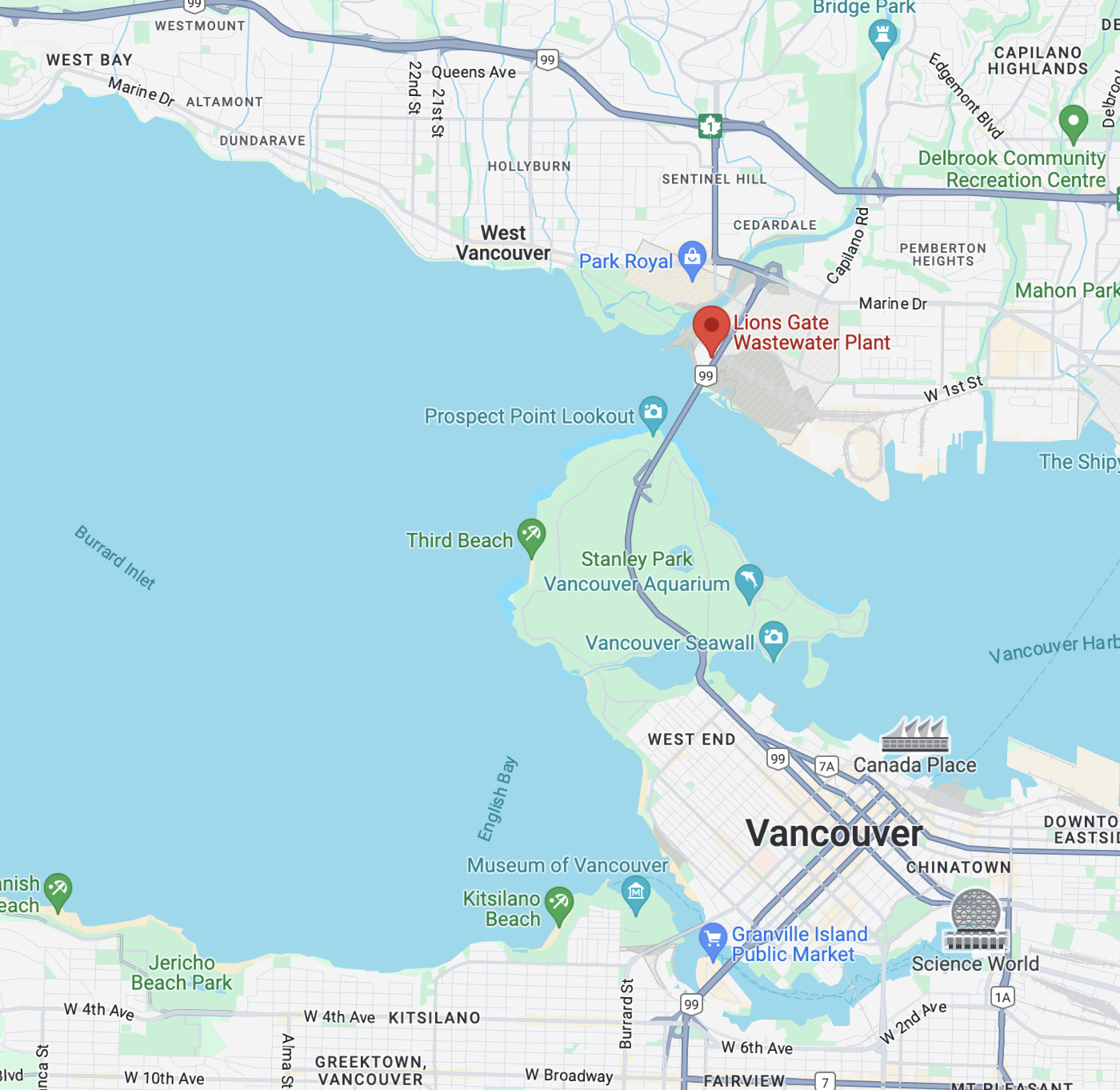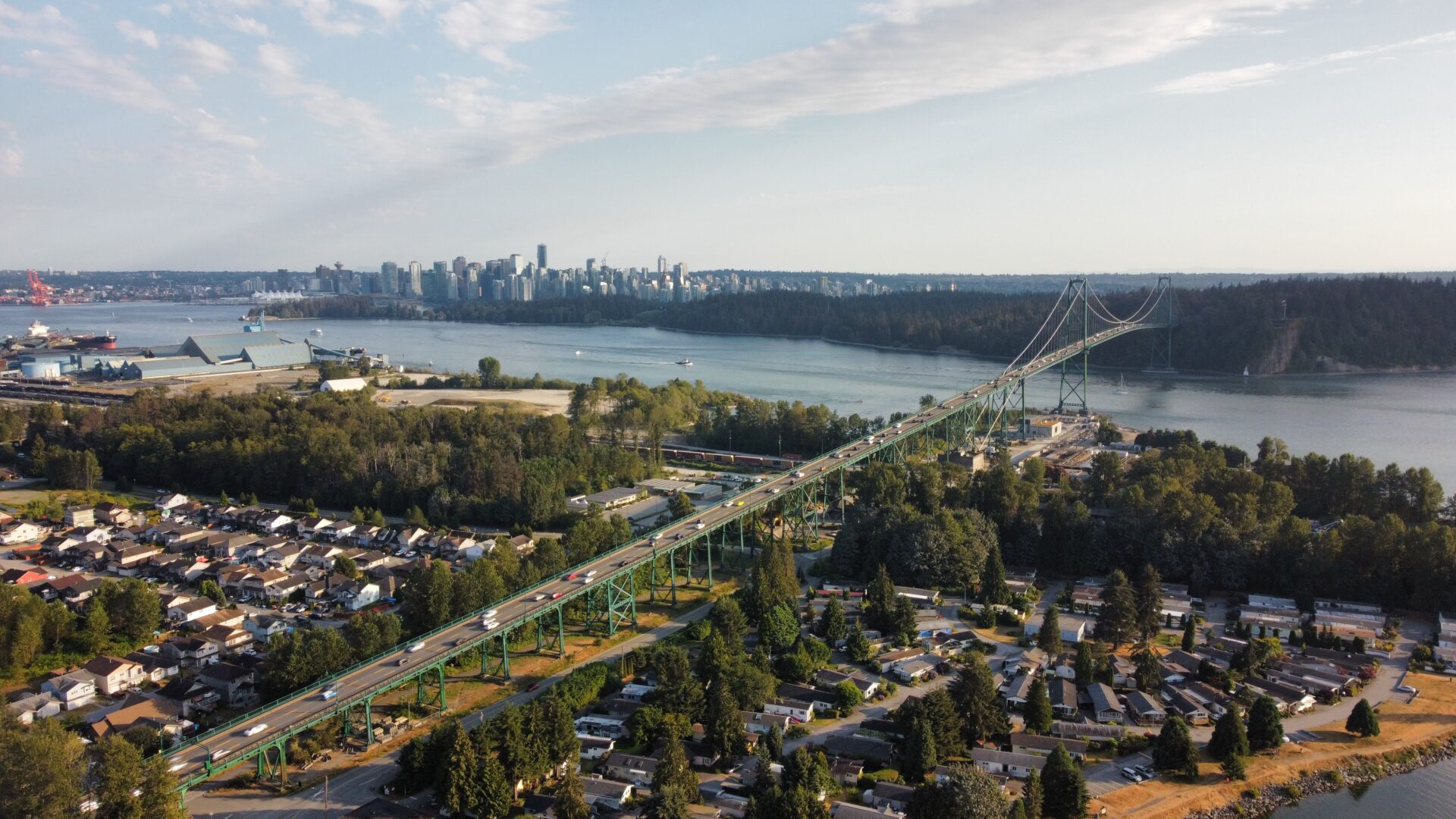Planetary Technologies Inc. (Planetary) is developing methods for restoring ocean water damaged by decades of carbon dioxide pollution. A field trial in Burrard Inlet will help us develop our methodology to safely remove carbon dioxide from the ocean.
The field trial is projected to start in spring 2025 and will add a small amount of mineral alkalinity (more commonly known as antacid) to the outflow at Metro Vancouver’s Lions Gate Wastewater Treatment Plant. The treated wastewater with the added antacid will be released into Burrard Inlet through the plant’s existing outfall.
The goal of this trial is to gather data and learnings to further develop methods that increase the ocean’s absorption and storage of carbon dioxide. This process is known as Ocean Alkalinity Enhancement (OAE). By adding the antacid to the seawater, we aim to remove carbon dioxide from the water and safely store it in the water. Over time, this would also enable the water to in turn absorb carbon dioxide from the atmosphere.
For more information on how the OAE process works and why it helps tackle climate change, check out Planetary’s website Science page. For information on how we ensure safety, see our Safety page.

Project Description
Planetary is working with Metro Vancouver and independent researchers at UBC and Ocean Networks Canada to plan and support a small-scale field trial in Burrard Inlet.
The first stage of this project is to collect baseline information on the waters near the existing Lions Gate outfall. Activities include:
- examining historical ocean data collected in this area,
- collecting new ocean baseline data throughout Burrard Inlet and Vancouver Harbour,
- conducting controlled lab experiments to test overall effectiveness of the selected antacid on the treated wastewater effluent as well as ocean water, and
- developing ocean modelling tools to track local ocean currents and ocean chemistry.
Pending the results of the first stage, the next stage would be a small-scale field trial projected to start in spring 2025 that will add small amounts of antacid to the treated effluent at Lions Gate Wastewater Treatment Plant. The antacid will neutralise some of the acidity in the seawater.
All scientific results from this project will be validated by independent third parties. Planetary will publish data analyses for access by all interested parties.
The primary scientific goals for this project are:
- Investigating the potential of our OAE process in reversing local ocean acidification,
- Determining whether a larger OAE project is appropriate for this site and for the Georgia Strait, and
- Refining our monitoring and modelling procedures for this location.
Additionally, Planetary hopes that this project will lay the foundation for a collaborative working relationship between Planetary, Metro Vancouver, and the local community, particularly Indigenous rightsholders. Over the course of this initial project, we aim to co-create a model for project development that will benefit all involved parties.
Why Here?
Planetary selects project sites based on the oceanographic characteristics of the region, such as the depth and circulation patterns of the waters, as well as the availability of baseline data and ocean models that support us to design and monitor the project.
Beyond this, based on our initial planning activities with partners in the region, Metro Vancouver region will allow us to engage, learn, and grow together as a community to explore the benefits of:
- World-class collaboration tackling climate change. This trial includes globally recognized researchers from the University of British Columbia (UBC) in both ocean and social sciences, scientific and technological expertise from Oceans Networks Canada, operational support from Metro Vancouver, and funding support from the BC Centre for Innovation and Clean Energy.
- Indigenous Partnerships. Planetary is actively seeking Indigenous partnerships and alignment in the early stages of this project and throughout as we aim to prove the effectiveness, safety, and economics through careful scale up. These partnerships could take many forms including but not limited to:
-
- taking a worldview that integrates multiple perspectives and values;
-
- engagement to incorporate traditional knowledge into the planning and design of the project and locations;
-
- the provision of key services like ecosystem monitoring;
-
- additional potential economic opportunities for communities hosting sites in their marine territories
-
- maturing our ocean carbon removal platform to the point where it could be used by Indigenous communities to develop and operate projects with benefits to both the ocean and the climate
- Addressing impacts of carbon pollution and ocean acidification. The British Columbia Ocean Acidification and Hypoxia Action Plan identifies ocean acidification as a significant climate change risk that threatens the health of marine ecosystems and the wellbeing of coastal communities, First Nations, and local industries. Given the unique combination of oceanographic conditions and ocean observing and modelling capability in the area, the Salish Sea and Georgia Strait present a good opportunity for Planetary to investigate the potential positive impacts of both removing harmful CO2 from the atmosphere, and locally reducing ocean acidification.
- Potential for larger scale carbon removal. Several sites in the Metro Vancouver region show potential for future OAE. Over time, multiple sites operating in one region could collectively remove millions of tonnes of CO2 from the water every year while benefiting the local ecosystem and economy. The proposed trial is a first step to understanding whether such scaling would be appropriate in Vancouver.
Local Collaborators and Community Engagement
Planetary is collaborating with several local groups to guide our project design and operations, as well as offer a diverse set of perspectives on our practices. These include:
Metro Vancouver: We will use the outfall at Metro Vancouver’s Lions Gate Wastewater Treatment Plant to add antacid to Burrard Inlet.

University of British Columbia – Department of Earth, Ocean, and Atmospheric Sciences: Researchers will be independently monitoring Burrard Inlet before, during, and after the antacid addition. They are also monitoring the circulation of alkalinity and calculating carbon dioxide removal.

University of British Columbia – Institute for Resources, Environment and Sustainability: Social scientists are exploring public thinking about OAE, including the conditions that would ensure trust across all parties and any conditions that are seen as most desirable for potential longer-term deployment of OAE in the region. In particular, this team aims to design an approach to ensure that local communities and rights holders are able to participate in decision making throughout the evolution of the project with attention to designing participatory governance structures for overseeing further research and deployment.
Getting Involved
We encourage you to stay involved and in touch. If there is a topic that you would like to hear more about, please contact us at lions_gate_project@planetarytech.com
For More Information
For frequently asked questions specific to this project, please visit our General FAQs as well as Vancouver FAQs for project specific questions.


